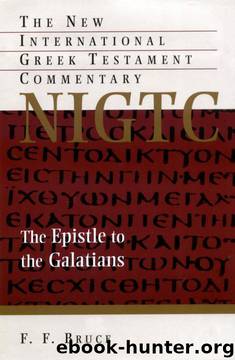The Epistle to the Galatians by F. F. Bruce

Author:F. F. Bruce [Bruce, F. F.]
Language: eng
Format: epub
Tags: Bible Study & Reference, Biblical Commentary, Biblical Reference, Biblical Studies, Christian Books & Bibles, Commentaries, Language Study, New Testament, Paul's Letters, Reference, Religion, Religion & Spirituality, Religious Studies & Reference
ISBN: 0802823874
Amazon: B00B98QB6O
Publisher: Wm. B. Eerdmans Publishing
Published: 1982-08-23T22:00:00+00:00
TEXTUAL NOTES
v1 e(3aoxavev K A B D* G pc lat`'K syr"' / add zrj aXrl9eta [r] netOeo9aL (under influence of 5:7) C DI K L P l byz lat°g'c" syr°c1
npoeypa(Prl / add ev vµty D G byz lat°g't" syrh`''
3:1 cu &v61TOt fakdTat. For the vocative cf. 2 Cor. 6:11 (Kop(v0Lot); Phil. 4:15 ((NkLjnijotot). In these two places the readers are addressed as residents in specific cities; in this letter, which is being sent to churches in several cities, the readers are addressed as residents in a specific province (see p. 16 on the appropriateness or otherwise of calling them TakdTat). The prefixed cu (absent from 2 Cor. 6:11 and Phil. 4:15) expresses emotion (unlike the vocative 1 in Attic which was quite unemotional); some would therefore accent it th (cf. BDF 146.2).
For the vocative &v6rltoL cf. Lk. 24:25, where it is applied by the risen Lord to the two disciples on the Emmaus road and coupled with (3pateic trl xap&ia, `slow of heart' (i.e. of understanding). In Rom. 1:14 &vo yroO is the antithesis of aocpos. Paul uses the adjective here and in v 3 to emphasize the illogicality of the Galatians' retrogression.
iLs vµas E06oxavEV; (3aoxa(vw (here only in the NT) means `fascinate' (from the cognate Lat. fascino) or `bewitch' (originally by means of the evil eye). The other meaning, `envy' (cf. Dt. 28:56 LXX), is not relevant here. Translate: `who has hypnotized you?' Their new behaviour was so strange, so completely at odds with the liberating message which they had previously accepted, that it appeared as if someone had put a spell on them. Cf. R. Haughton, The Liberated Heart (London, 1975), 100f.
The added clause in AV/KJV, `that ye should not obey the truth', has intruded into the text here under the influence of 5:7. Jerome remarks (ad loc.): `In certain manuscripts (in quibusdam codicibus) it reads: "Who has bewitched you that you should not obey the truth?" But because this is not present in the Greek copies of Adamantius [i.e. Origen], we have omitted it.'
oLs xai' ocp9a7 µovs 'Ir)oovs XeLozos neoeyecp1q eotavew thvog. Elswhere in the NT neoyeacpw has its ordinary sense `write in advance'-e.g. in OT prophecy (Rom. 15:4; Jude 4) or in a previous letter or earlier in the same letter (Eph. 3:3). But here the prefix neo- is locative, not temporal: `display before (one's audience)', as on a public placard-a thoroughly classical usage. Luther ('welchen Jesus Christus vor die Augen gemalt war') and others have thought that the idea is of a verbal picture painted before the hearers' eyes (xat' 6cpOaX,µovs), a vivid description of the crucifixion of Christ; G. Bornkamm (with greater probability) prefers the idea of a notice or proclamation publicly set up, `a decree promulgated by authority' (Paul, 159). Marius Victorinus (ad loc.) curiously understands neoYeacpw in the sense of Lat. proscribo ('proscribe'): `Christ was proscribed, i.e. his property was divided into lots and soldthe property (namely) which he had in us, and which has been put up to auction, sold and dissipated by the persuasive influence of Judaism.
Download
This site does not store any files on its server. We only index and link to content provided by other sites. Please contact the content providers to delete copyright contents if any and email us, we'll remove relevant links or contents immediately.
| New Testament | Old Testament |
The Five People You Meet in Heaven by Mitch Albom(2870)
Name Book, The: Over 10,000 Names--Their Meanings, Origins, and Spiritual Significance by Astoria Dorothy(2514)
Real Sex by Lauren F. Winner(2506)
The Holy Spirit by Billy Graham(2453)
The Secret Power of Speaking God's Word by Joyce Meyer(2275)
How The Mind Works by Steven Pinker(2251)
0041152001443424520 .pdf by Unknown(2247)
ESV Study Bible by Crossway(2213)
Ancient Worlds by Michael Scott(2136)
The Meaning of the Library by unknow(2090)
The Gnostic Gospels by Pagels Elaine(2054)
Churchill by Paul Johnson(2032)
The ESV Study Bible by Crossway Bibles(2027)
MOSES THE EGYPTIAN by Jan Assmann(1993)
Jesus by Paul Johnson(1908)
Ancient Near Eastern Thought and the Old Testament by John H. Walton(1869)
The Complete Dead Sea Scrolls in English (7th Edition) (Penguin Classics) by Geza Vermes(1866)
The Nativity by Geza Vermes(1865)
City of Stairs by Robert Jackson Bennett(1863)
